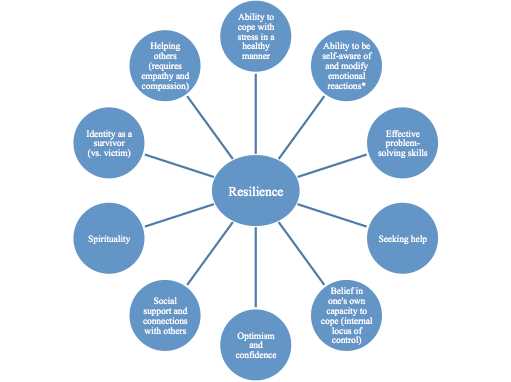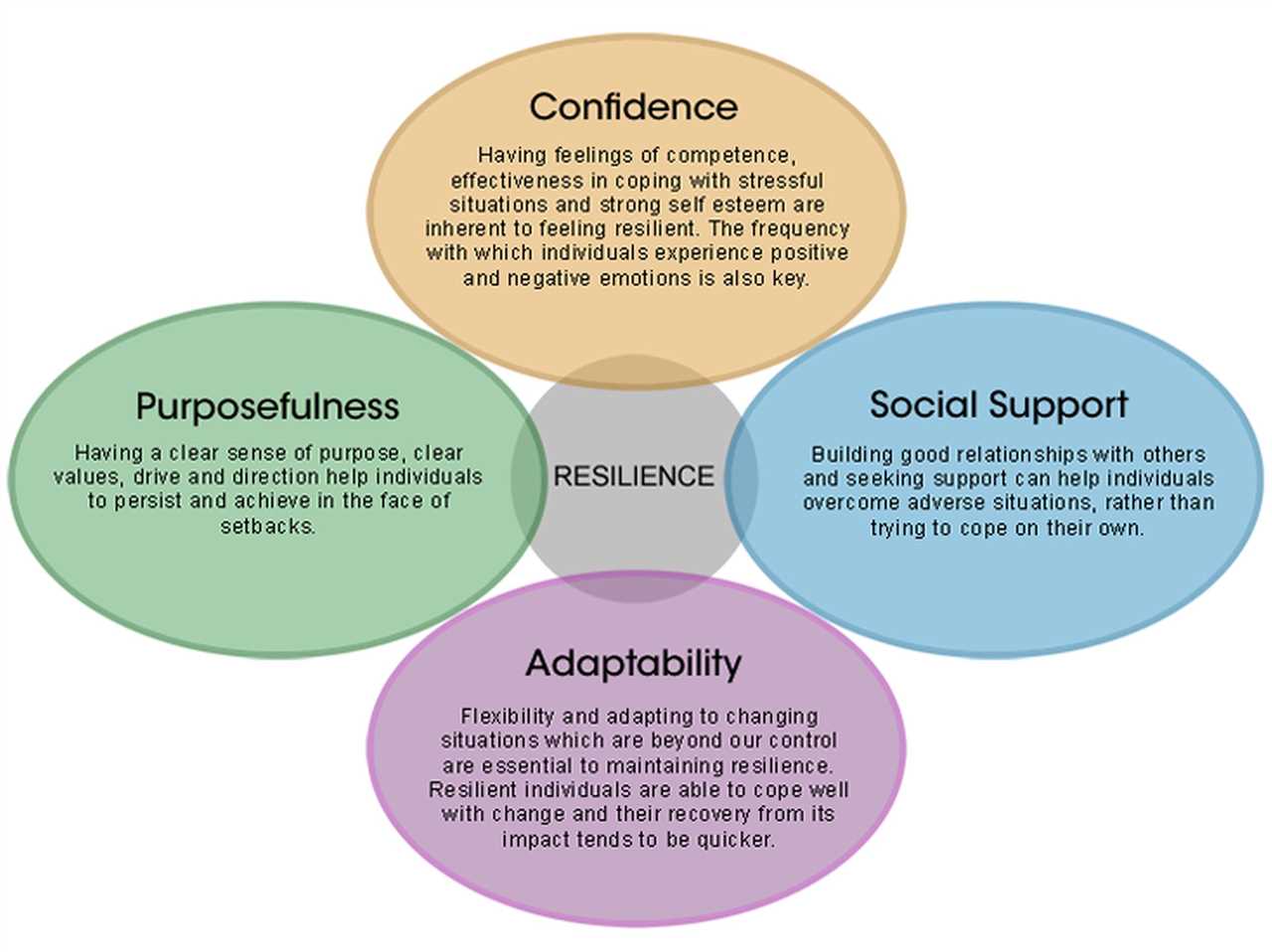
Resilience is a quality that enables individuals to bounce back from adversity and face challenges head-on. It is the ability to persevere in the face of obstacles and setbacks, and to maintain a positive attitude and outlook on life. Resilient individuals possess a unique set of characteristics that allow them to navigate through difficult times with strength and determination.
Tenacity is one of the key characteristics of resilience. It is the quality of being persistent and determined, never giving up even when faced with seemingly insurmountable obstacles. Resilient individuals have the ability to stay focused on their goals and find alternative solutions to overcome difficulties.
Another important trait of resilience is resourcefulness. Resilient individuals are able to think creatively and find innovative ways to solve problems. They are not afraid to seek help and support from others, and are willing to explore different options and perspectives.
Stamina and perseverance are also essential characteristics of resilience. Resilient individuals have the physical and mental strength to endure challenges and setbacks. They have the ability to keep going even when they feel tired or discouraged, and they are willing to put in the necessary effort to achieve their goals.
Positivity and optimism are key components of resilience. Resilient individuals have a positive mindset and believe in their ability to overcome obstacles. They have the ability to see setbacks as opportunities for growth and learning, and they maintain a hopeful outlook even in the face of adversity.
Adaptability is another important characteristic of resilience. Resilient individuals are flexible and able to adjust to new situations and changes. They are open to new ideas and perspectives, and are willing to make necessary adjustments in order to thrive in different circumstances.
Grit is a quality that is often associated with resilience. Resilient individuals have a strong sense of determination and passion for their goals. They are willing to put in the necessary effort and hard work to achieve success, and they have the ability to stay committed and focused even when faced with challenges.
In conclusion, resilience is a complex and multifaceted quality that is characterized by traits such as tenacity, resourcefulness, stamina, perseverance, positivity, adaptability, optimism, and grit. These characteristics enable individuals to navigate through difficult times with strength and determination, and to bounce back from adversity with resilience and grace.
Key Characteristics of Resilience

Resilience is a valuable trait that allows individuals to overcome adversity and bounce back from challenging situations. There are several key characteristics that resilient individuals possess:
Resourcefulness: Resilient individuals are resourceful and find ways to navigate difficult circumstances. They are able to think creatively and find solutions to problems.
Stamina: Resilient individuals have the physical and mental stamina to withstand prolonged periods of stress and adversity. They are able to push through difficult times without becoming overwhelmed.
Tenacity: Resilient individuals have a strong sense of determination and perseverance. They are willing to work hard and keep going, even when faced with obstacles.
Flexibility: Resilient individuals are able to adapt and adjust to changing circumstances. They are open to new ideas and are willing to change their approach when necessary.
Positivity: Resilient individuals maintain a positive mindset even in the face of adversity. They are able to find the silver lining in difficult situations and focus on the possibilities for growth and learning.
Optimism: Resilient individuals have a hopeful outlook on life and believe that things will work out in the end. They have confidence in their ability to overcome challenges and achieve their goals.
Grit: Resilient individuals have a strong sense of determination and are willing to persevere through difficult times. They are able to stay focused on their goals and keep pushing forward.
Adaptability: Resilient individuals are able to adapt to new situations and embrace change. They are flexible in their thinking and can adjust their plans as needed.
Overall, these key characteristics of resilience contribute to an individual’s ability to navigate and overcome adversity. Developing these traits can help individuals build resilience and thrive in the face of challenges.
Understanding the Traits of Resilient Individuals

Resilient individuals possess a unique set of characteristics that enable them to navigate and overcome challenges. These traits include:
- Perseverance: Resilient individuals have the ability to persist in the face of adversity and keep working towards their goals, even when faced with setbacks.
- Grit: Resilient individuals have a strong passion and determination to achieve their objectives, often going above and beyond what is required.
- Adaptability: Resilient individuals are able to adjust and thrive in new and changing environments, finding creative solutions to unexpected challenges.
- Flexibility: Resilient individuals can bend and adjust their plans and approaches when necessary, without losing sight of their ultimate objectives.
- Stamina: Resilient individuals have the physical and mental endurance to withstand prolonged periods of stress and pressure.
- Optimism: Resilient individuals maintain a positive outlook, believing that they have the ability to overcome challenges and achieve success.
- Positivity: Resilient individuals approach difficulties with a positive attitude, focusing on finding solutions rather than dwelling on problems.
- Resourcefulness: Resilient individuals are creative and resourceful in finding ways to overcome obstacles, using their available resources to their advantage.
By understanding and cultivating these traits, individuals can develop resilience and better navigate the ups and downs of life.
Emotional Intelligence and Self-Awareness

Emotional intelligence and self-awareness are key characteristics of resilient individuals. They involve the ability to recognize and understand one’s own emotions, as well as the emotions of others. This awareness allows individuals to effectively manage their emotions and navigate challenging situations with positivity, tenacity, perseverance, and optimism.
Resilient individuals demonstrate resourcefulness and adaptability in the face of adversity. They are able to identify and leverage their strengths and resources to overcome obstacles and achieve their goals. Their ability to adapt to changing circumstances and find creative solutions enables them to bounce back from setbacks and maintain a sense of forward momentum.
Grit and flexibility are also important aspects of emotional intelligence and self-awareness. Resilient individuals possess the determination and resilience to keep pushing forward, even when faced with significant challenges. They are able to maintain a positive mindset and view setbacks as opportunities for growth and learning.
Furthermore, self-awareness plays a crucial role in emotional intelligence. It involves the ability to accurately perceive one’s own emotions, strengths, and weaknesses. This self-awareness allows individuals to effectively regulate their emotions and make conscious choices about how to respond to difficult situations.
In conclusion, emotional intelligence and self-awareness are essential traits of resilient individuals. They enable individuals to effectively manage their emotions, adapt to changing circumstances, and maintain a positive mindset in the face of adversity. By cultivating these characteristics, individuals can enhance their resilience and navigate life’s challenges with grace and strength.
Problem-Solving and Adaptability

Resilient individuals possess key traits that enable them to effectively navigate through challenges and setbacks. One of these traits is problem-solving and adaptability.
Resilient individuals approach problems with a sense of positivity and flexibility, allowing them to find creative solutions and adapt to changing circumstances. They have the stamina and optimism to persevere through difficult situations, demonstrating tenacity and grit.
Resourcefulness is another important characteristic of resilient individuals. They are able to think outside the box and find innovative ways to overcome obstacles. Their ability to adapt and find alternative solutions is a testament to their resilience.
Resilient individuals also exhibit perseverance in the face of adversity. They are determined and willing to put in the necessary effort to overcome challenges. This trait allows them to bounce back from setbacks and continue moving forward.
In summary, problem-solving and adaptability are key characteristics of resilient individuals. Their positivity, flexibility, stamina, optimism, tenacity, grit, resourcefulness, and perseverance enable them to effectively navigate through challenges and setbacks, ultimately leading to personal growth and success.
Optimism and Positive Mindset

Optimism and positive mindset are key characteristics of resilient individuals. These traits enable individuals to maintain a sense of adaptability, flexibility, and perseverance in the face of adversity. Resilient individuals possess a resourcefulness and positivity that allows them to find creative solutions to problems and navigate difficult situations.
Optimism is the belief that things will work out for the best, even in challenging circumstances. It is the ability to see the silver lining in every cloud and maintain a hopeful outlook. Resilient individuals possess a natural optimism that helps them to bounce back from setbacks and maintain a sense of hope for the future.
Positive mindset goes hand in hand with optimism. It is the ability to maintain a positive attitude and outlook, even in the face of obstacles. Resilient individuals possess a stamina and determination that allows them to stay focused on their goals and keep pushing forward, even when the going gets tough.
Grit is another characteristic closely associated with optimism and positive mindset. It refers to the ability to persevere and maintain a determined attitude, even in the face of challenges. Resilient individuals possess a level of grit that enables them to stay committed to their goals and overcome obstacles with persistence and determination.
Overall, optimism and positive mindset are essential traits for building resilience. They allow individuals to approach challenges with a sense of hope and determination, enabling them to adapt, be flexible, and persevere in the face of adversity. By cultivating a positive mindset and embracing optimism, individuals can develop the resilience needed to thrive in the face of life’s challenges.
Strong Social Support Network

Resilient individuals possess a strong social support network that provides them with the necessary emotional and practical support during challenging times. Their tenacity, adaptability, positivity, and stamina are enhanced by the presence of a supportive community.
Having a strong social support network helps individuals build resilience by fostering a sense of belonging and connectedness. This network consists of family, friends, colleagues, and other individuals who offer encouragement, understanding, and assistance when needed.
Resilient individuals are optimistic and resourceful, and they have the ability to seek help and support from others. They understand the importance of reaching out and relying on their social support network during times of stress, trauma, or adversity.
Furthermore, a strong social support network provides individuals with opportunities for social interaction, which can help them develop coping strategies and learn from others’ experiences. It also offers a sense of validation and affirmation, reinforcing their belief in their own abilities and resilience.
Resilient individuals are flexible and adaptable, and they recognize that seeking support is not a sign of weakness but rather a strength. They are willing to ask for help and accept it when offered, knowing that it can contribute to their overall well-being and ability to bounce back from challenges.
In summary, a strong social support network is a crucial characteristic of resilient individuals. It enhances their resilience by providing them with the emotional and practical support they need, reinforcing their optimism, resourcefulness, and flexibility, and offering opportunities for social interaction and learning. Building and nurturing a strong support network is essential for developing and maintaining resilience in the face of adversity.

I am Patrina de Silva, a psychologist and mental health blogger in Sri Lanka. After obtaining psychology degrees from the University of Colombo and Monash University, I returned home to work as a counselor while also starting the popular blog “Pressy but Happy” to provide advice on psychological issues. Over the past decade, my empathetic articles have made my blog a leading mental health resource in the country. In addition to writing, I maintain a private therapy practice, frequently volunteer counseling time, and conduct seminars, driven by my passion for destigmatizing mental illness and educating the public on the mind-body connection. I strive to be an influential voice in my field through my compassionate approach.
